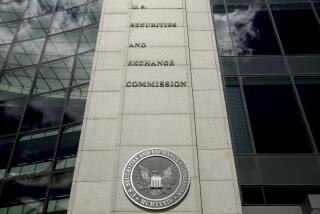Magna Backers Indicted for Stock Fraud
- Share via
Four former promoters of a defunct Thousand Oaks company have been named in a 42-count criminal indictment unsealed by a grand jury in Los Angeles Tuesday.
The charges, stemming from the rapid rise and collapse of the stock of Magna Technologies in 1985, include multiple counts of conspiracy and securities and wire fraud. The indictment says Magna was a “shell corporation” with no assets that was used by the defendants to profit by manipulating its stock.
Named in the indictment were Jacob Rubenstein, formerly of Woodland Hills; Robert Gutstein, an Agoura Hills plastic surgeon who was Magna’s chairman; Robert Victor of Las Vegas, and Herbert Stone, a former New York stockbroker. Rubenstein, Gutstein and Victor all held large blocks of Magna shares; Stone was the primary market maker for the stock.
The indictment was returned by the grand jury March 7.
Magna once claimed to have plans to market such unusual products as a 45,000-volt “stun gun,” an “insta-cup” to make instant soup, a device to help sexually impotent men and a hand-held, battery-powered pain reliever.
John F. Walsh, assistant U.S. attorney, said Tuesday that the company “didn’t produce any products” during the period identified in the indictment.
Rubenstein, Gutstein, Stone and four others were also named in a civil suit filed by the Securities and Exchange Commission in May, 1987, which accused them of manipulating Magna stock. The defendants entered summary judgments in which they did not admit or deny guilt but agreed to stop the activities cited in the suit.
According to the indictment, Rubenstein and the others used fraudulent schemes to manipulate Magna’s stock, including inducing friends and relatives to set up accounts to trade in Magna stock to create the impression of interest in the stock. However, Rubenstein and the others actually controlled the accounts, it says.
The indictment also says the defendants ordered Magna stock without intending to pay for it--a practice called “free-riding”--and when actual investors tried to sell Magna stock, they refused or failed to execute the sell order. They also released false and misleading information about the company’s products, it said.
Magna’s stock rose from 50 cents a share in March, 1985, to a peak of $9.50 in September, 1985. During that time, the defendants made more than $1 million in profits by selling their shares. Soon after, the stock collapsed and became virtually worthless.
Walsh said Rubenstein is a fugitive. David L. Kagel, Rubenstein’s former attorney, said he hadn’t seen him in more than a year and didn’t know where he was.
More to Read
Inside the business of entertainment
The Wide Shot brings you news, analysis and insights on everything from streaming wars to production — and what it all means for the future.
You may occasionally receive promotional content from the Los Angeles Times.











